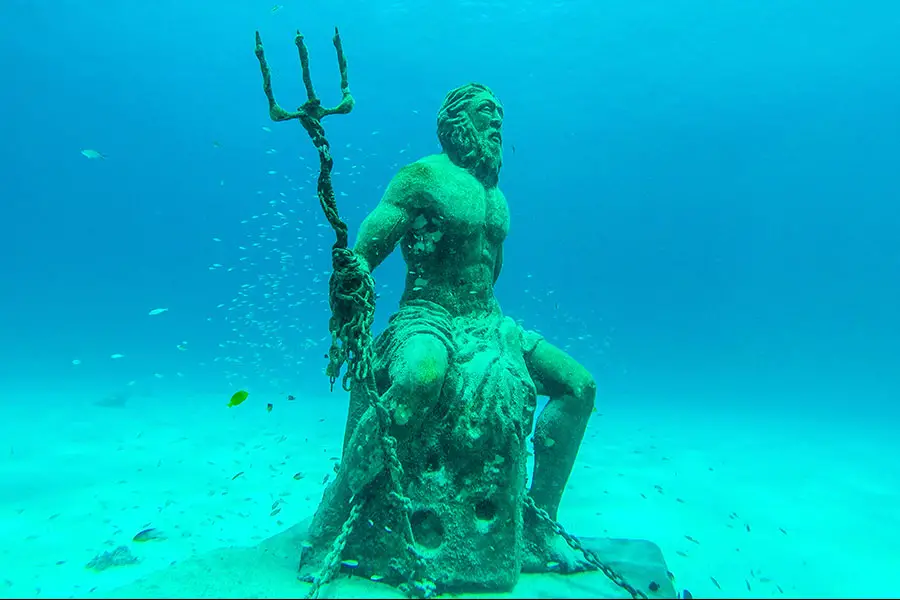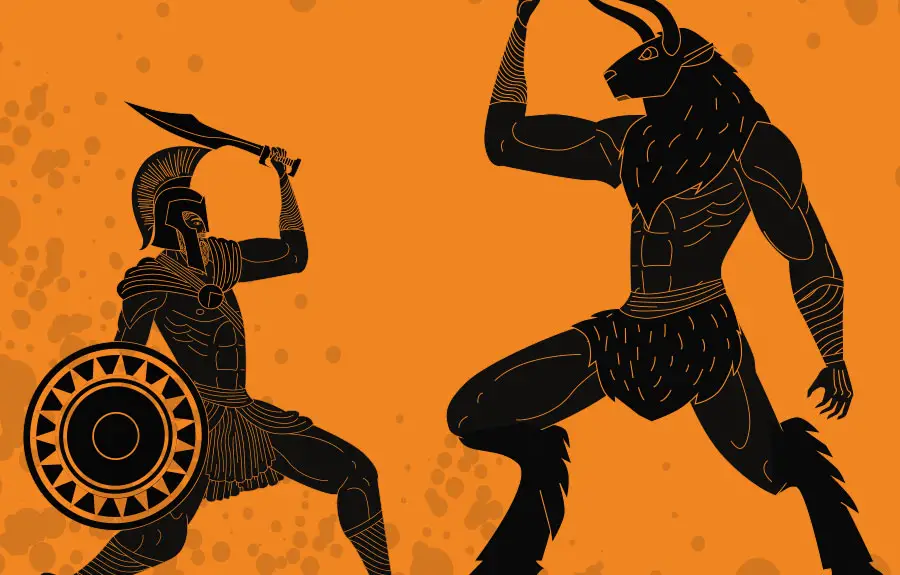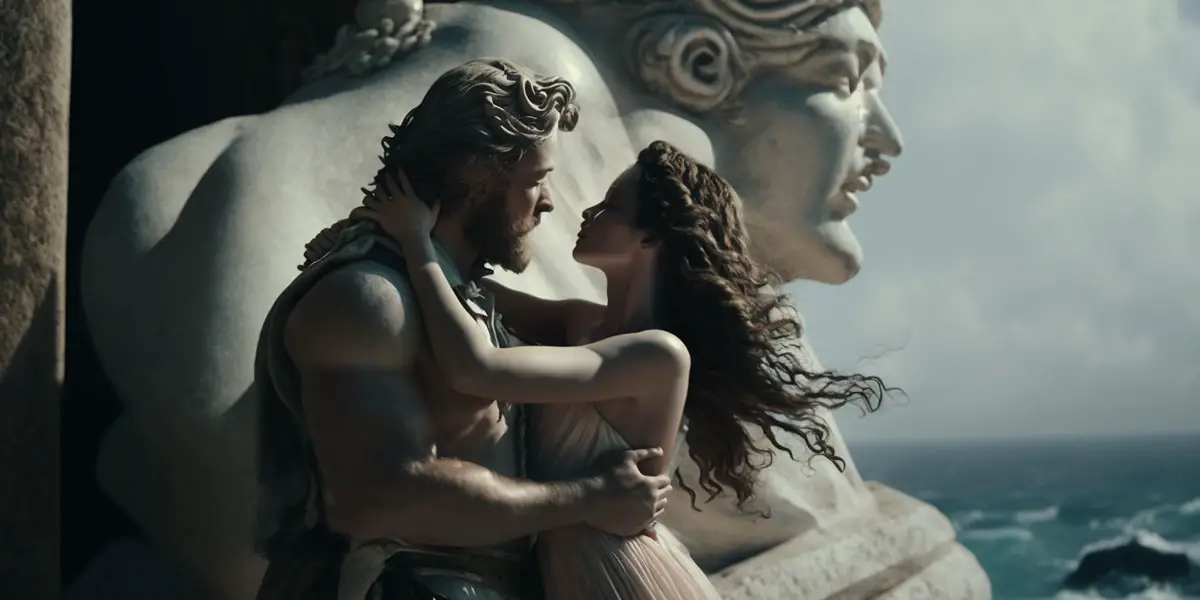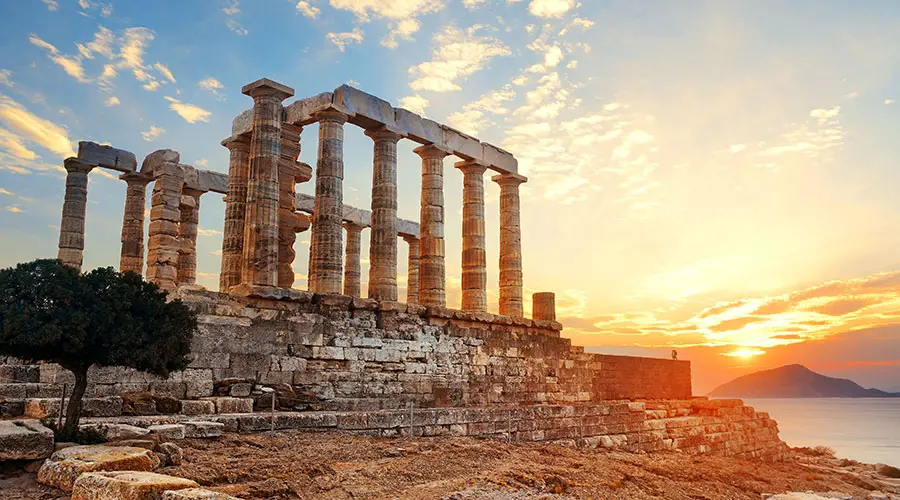In Greek mythology, Poseidon is one of the most important and well-known gods. In this article we are going to answer the question: What is the personality of Poseidon the greek god?
Poseidon is known for his moody personality, and violent temper. He is the god the sea, carries a trident, and is represented by the bull, the horse, and the dolphin. His many interactions with mortals show his vengeful and lustful personality, as well as a caring and protective side.
Despite creating storms out of anger to punish mortals, he falls deeply in love with his young mortal wife, and is highly protective of his children.

Poseidon’s Origins, and the Overthrow of Cronus
In the beginning of Greek mythology Cronus was the king of the gods. He was the son of heaven and earth, and along with his wife Rhea, he had three sons and three daughters. He had been warned that eventually his children would rise up to overthrow him and because of this warning he would swallow whole his own children at birth, to try to prevent this from happening.
His wife Rhea tricked him when one of the sons were born, and instead of swallowing the son, he actually swallowed a stone. That son was Zeus, and when he grew up, along with the help of the goddess Metis, he fed Cronus an elixir which caused him to dispel Poseidon and the other offspring he had swallowed.
Then Zeus, Poseidon and Hades worked together and deposed their father Cronus and the other elder gods, imprisoning them in Tartaros, a deep abyss where souls are judged after death and punished.
Since Cronus was no longer king of the gods, the three brothers divided up the world between themselves. Zeus was given the sky, Hades the underworld, and Poseidon the sea, with the Earth and Mount Olympus belonging to all three.
Symbols of Poseidon
The main symbol of Poseidon is the trident, a three-pronged fishermen’s spear which he carries. During the war of the Titans, a group of three Cyclopes made it for him. It is a magical trident, and he can use it to shatter rocks, produce or subdue storms, and shake the earth causing earthquakes. As the god of earthquakes, in ancient Greece he was known as Ennosigaios (“earth-shaker”) and was worshipped as Asphalios (“stabilizer”).
The Trident represents the number three, and according to some scholars of Atlantis, Poseidon’s trident symbolized his kingdom covering the areas of land. In numerology, the number 3 is youthful, interactive, original, creative, and great at communication.
Poseidon’s Sacred Animals: The Bull, the Horse, and the Dolphin
In Greek mythology, Poseidon created the horse as a gift to the mortals. According to historians, the horse was introduced to Greece in the 2nd century B.C by the Hellenes people, and Some theorize they introduced Poseidon to Greece as well.
According to Plato’s descriptions of Atlantis, the temple of Poseidon featured a massive statue of the god being pulled in a chariot by winged-horses, and accompanied by dolphins. In fact, Poseidon, along with Medusa, fathered Pegasus, the winged horse. He also had a special relationship with dolphins, who would act as messengers for him.
Poseidon is credited with creating Atlantis, which had extensive tracks for horse racing, and featured prominent horse symbolism throughout. The horse symbolizes freedom, independence, and competition. According to the work of Ignatius Donnelly, the legendary researcher on Atlantis from the 19th century, the horse is evidence that Atlantis actually existed. He claimed that those originated in North America, and its presence in Europe indicated that a continent had existed in the Atlantic Ocean which allowed for interaction between North America and Europe thousands of years ago. You can read more about Donnelly’s work on Atlantis here.
Poseidon’s association with the bull can be seen in the story of Minos, the king of Crete. Minos prayed to Poseidon to send him a snow-white bull as a sign that he would be the ruler instead of his brothers, who also coveted the throne. Poseidon sent Minos the bull with the understanding that it would be a sacrifice to the gods. However, Minos felt that the bull was too fine to be sacrificed, and replaced it with an inferior one, keeping the bull that Poseidon sent in his herd. Enraged, Poseidon exacted revenge by causing Mino’s wife to fall in love with the bull, who then gave birth to the Minotaur, a half-human, half-bull creature.

Characteristics of Poseidon
Known as Neptune during Roman times, he is usually depicted as a mature, bearded man, often wearing a loose-fitting robe or cloak, with a headband or wreath of wild celery. As seen in the story with Minos, he can be very vengeful, and cruel, however he also has other sides to his personality.

Poseidon is vengeful
Another example of Poseidon’s vengeful nature is displayed when a contest was held to see which god would hold dominion over an area of land called Attica. The gods decided that the land would be named after the god who produced the most useful gift to the mortals. This is when Poseidon produced the very first horse. However, he was refused the prize, and the land became Athens, after the goddess Athena created the olive tree. In retaliation Poseidon cursed the land with droughts.
In another example, Poseidon aided King Laomedon in building the walls of the city of Troy, but when the king refused payment, Poseidon sent a sea monster to wreak havoc on the city.
Poseidon is a Loyal Ally
In Homer’s Iliad, Poseidon supports the Greeks against the Trojans during the Trojan War. Also, when the affair between Ares and Aphrodite was discovered, Poseidon used his influence to have them set free from the magical net that they were caught in. And of course, it was through the cooperation with Zeus and Hades that they were able to overthrow Cronus.

Poseidon is a Prolific Seducer
He had many lovers, including goddesses, nymphs, and mortals. Some of his lovers were Medusa, Tyro, Amymone, and Aithra. and Aphrodite. In part because of his seductive ways, Poseidon had many children, whom he is very protective of.
Poseidon is Protective of His Family
With Tyro, he was the father of Pelias and Neleus, whose descendants would go on to form the royal families of Thessaly and Messenia.
He also had some offspring in the form of monsters, such as Orion, Antaeus, and Polyphemus. Perhaps most well-known of these is Trident, whom he fathered with his wife Amphitrite. Trident also carries a trident, and has the upper body of a man and the lower body of a fish.
An example of Poseidon being highly protective of his children can be found in the story of the Odyssey. The Greek hero Odysseus is returning home to Ithaca from the Trojan war. After having their ship blown off course, Odysseus and his crew discover an island with meats and cheeses in a cave. After feasting, the owner of the cave returned home, trapped the men in the cave, and began eating them. Odysseus offered the cyclops wine to get him drunk, and then he and his men drove a huge wooden spike through his single eye and escaped. The cyclops was Polyphemus, one of the cyclops who built Olympus for the gods, and son of Poseidon. Poseidon responded by punishing Odysseus with storms, destroying his crew and ship, and causing a ten-year delay in his journey home.
Why is Poseidon the God of the Sea?
Poseidon became the god of the sea after drawings straws to divide the world between himself and his two brothers Zeus and Hades. Zeus became the god of the sky, Hades the god of the underworld, and Poseidon the god of the sea. They did this after defeating their father Cronus, the king of the Titans.
Does Poseidon like humans?
Poseidon did like humans, although he was very hostile towards them at times as well. He was actively involved in human affairs, and exhibited a wide range of attitudes towards mortals, including falling in love with his mortal wife Cleito, punishing Odysseus with storms out of revenge.
In the Odyssey, the great epic by Homer, Poseidon goes into a state of rage when he discovers his son has been blinded. Odysseus, the hero of the Odyssey, is sailing home after the Trojan war, and encounters Poseidon’s son, who is a cyclops, meaning he only has one eye. Odysseus blinds the cyclops, provoking the revenge of Poseidon, who unleashes severe storms which causes Odysseus to lose his crew and ship, and causes him to take an extra ten years to get home.
Poseidon and Medusa
Medusa was a beautiful mortal woman, who worked in the temple of Athena. Poseidon either seduced or raped her depending on the version of the myth, and impregnated her. Athena was angered because she required the priestesses in her temple to be virgins, so she cursed Medusa by turning her into a hideous monster. Medusa was then beheaded by the hero Perseus who presented the head to Athena. During the beheading, the two children whom Medusa was pregnant with from Poseidon sprung out. They were the winged horse Pegasos and the giant Chrysaor.
Who is More Powerful Zeus or Poseidon?
While Poseidon is a very powerful god, Zeus has more status and authority. Zeus is the god of the sky, and the king of Mount Olympus, which is the home of the Olympian gods. Zeus possesses the thunderbolt as his weapon, which was made and gifted to him by the same three cyclops who made the trident for Poseidon. Read more about Zeus and his thunderbolt here.
Recommended Reading
If you’d like to continue researching Poseidon or any of the other topics discussed on this website, you can see which books I recommend by clicking here.
